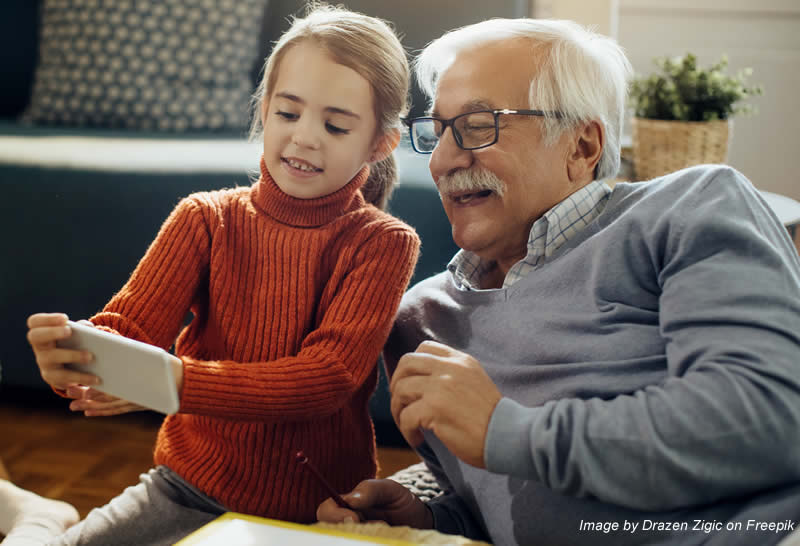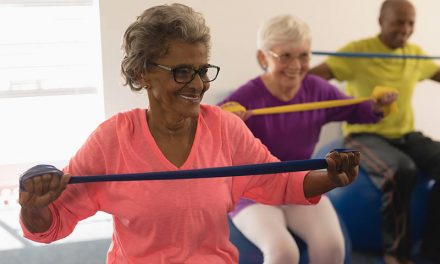The world is full of people of all different age groups. In order to live a well-rounded, balanced and connected life, you need to be able to relate to those who are both younger and older than yourself. Intergenerational activities can be incredibly enriching and offer unique opportunities for people of different age groups to connect and learn from each other. Here are ten ways to foster connections and enjoy activities together:
1. Spend time listening
Older people enjoy reminiscing about the ‘good old days’ and sharing precious memories. Taking the time to listen is a real gift to elders who are used to being given the brush-off or treated with impatience. Show respect by listening attentively, even if the conversation wanders, and asking questions. Younger people can share their own stories and experiences, creating understanding and appreciation for one another’s perspectives.
2. Cook or bake together
Cooking or baking can be a wonderful way to bond. Get granny to teach you how to make her legendary curry or cookies, so that the family tradition endures. Or try new dishes together and create new traditions.
3. Give a technology lesson
Offer to teach an elder about the latest technology or gadget. Many older adults are interested in learning how to use modern technology, such as smartphones, tablets, or social media. Younger individuals will need patience, but it’s incredibly rewarding to be the ‘teacher’ for a change, rather than the learner. Being able to empower a beloved grandparent in the digital world, and helping them to connect with people on social media, is very special.
4. Take a walk together
Even if it’s just a stroll around your local park or along the beachfront – or granny is in a wheelchair – you’ll both benefit from the fresh air and exercise. Older people are more likely to know the names of flowers, plants or birds seen along the way, and will enjoy sharing their knowledge. A 20 minute walk can also lead to meaningful conversation and sharing of thoughts and ideas.
5. Participate in intergenerational sports
Older adults who are fit and active will enjoy the challenge of a friendly soccer or cricket match against the kids. Swimming and dancing are other intergenerational activities that are enjoyable, regardless of age.
6. Play games or solve puzzles together
Whether you play card games, build a jigsaw puzzle together or challenge grandpa to a game of chess, Monopoly or backgammon, these activities stimulate the mind and encourage laughter and friendly competition.
7. Share hobbies and interests
Discover common interests and engage in intergenerational activities related to passions such as birdwatching, photography, knitting or gardening.
8. Learn a new skill together
Whether it’s learning to paint, dance, play a musical instrument or play bridge, learning something new together can create lasting memories and lead to lively discussions and shared experiences.
9. Offer to become pen pals with an older adult.
Writing to someone, rather than having a face-to-face conversation can be easier for young people, who may find themselves tongue-tied, or not know what to say when trying to connect with a formidable elder. Children, especially, find it very rewarding being able to share pictures and notes with a grandparent living in another town or country.
10. Celebrate holidays together
Holidays and important events, such as Heritage Day, Christmas, or cultural festivals are the perfect opportunity to bring older and younger individuals together to celebrate. This fosters a sense of belonging and creates lasting, enjoyable memories for all involved.
Intergenerational activities should promote inclusivity, understanding, and mutual respect. Emphasize the value of each individual’s contribution and ensure that everyone feels welcome and appreciated. It’s not uncommon for some young people to feel apprehensive or fearful around older individuals, especially if they haven’t had much experience interacting with them. Older people may appear intimidating – they may speak loudly owing to hearing problems, or seem impatient or bad tempered.
Fear often stems from stereotypes or preconceived notions about older individuals. Learning about the changes that occur as people grow older can help dispel misconceptions. You should also understand that age does not define a person’s character or abilities, and that each person is unique. Looking at old photographs together and learning about granny or grandpa’s career helps you understand that older people were once young too.
Asking questions is a great way to break the ice. Most older people enjoy talking about their life journey, interests, and accomplishments. Be patient and understanding, especially if the older person repeats themself or wanders off the point. Understand that some older individuals may have physical limitations or communication difficulties. But avoid making assumptions about their abilities or needs. Connect with them on a human level, and acknowledge that they have experienced many of the same emotions and challenges that you may be facing.
In this way, you’ll discover the enriching and meaningful relationships that can be formed across generations. Building bridges between different age groups can lead to a more inclusive and compassionate society for everyone involved.






 Christmas joy – thanks to you!
Christmas joy – thanks to you! Robin Hood Foundation spreads love across Tafta Homes
Robin Hood Foundation spreads love across Tafta Homes 12 Days of Giving – spread joy to older people this Christmas
12 Days of Giving – spread joy to older people this Christmas Tafta resident pens powerful tribute to heritage and hope in new book
Tafta resident pens powerful tribute to heritage and hope in new book Introducing TEAL – our upgraded national Elder Abuse Helpline
Introducing TEAL – our upgraded national Elder Abuse Helpline Beat the year-end blues – 6 tips for staying positive during ‘silly season’
Beat the year-end blues – 6 tips for staying positive during ‘silly season’ Wisdom on ageing – the most exquisite chapter
Wisdom on ageing – the most exquisite chapter Thriving through 2025 – a toast to life
Thriving through 2025 – a toast to life ‘Human Forever’ inspires Durban audience
‘Human Forever’ inspires Durban audience Celebrating 100 years of life with Mrs Rosemary De Waal
Celebrating 100 years of life with Mrs Rosemary De Waal